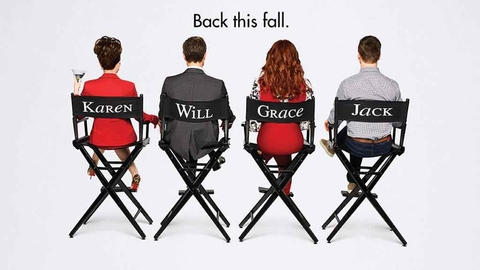Will the Will & Grace reboot fly?

by Rob Howard
Associate Editor
“When Will & Grace came on back in 1998, I was just out of college and coming to terms with my sexuality,” says Spencer Hankins from Oklahoma City. “For me it made that whole process easier because there on national television was a positive gay male living a happy, well-adjusted life."
Hankins is looking forward to the return of Will & Grace this fall. But not everyone is looking forward to the show. Floyd Martin, also of Oklahoma City, said, “I didn’t like it in the first place. I think it put an unhealthy face to the gay community. It was the first time a lot of people saw the gay community.”
Media responses to the coming September 28 premiere of the 12 episode series are equally mixed. Reviewers point to the changed climate in the country since the show’s 1998 roll-out. In the late 90s, a Gallup poll asking if “gay or lesbian relations between consenting adults should or should not be legal” showed 47 percent said “should not” while only 44 percent said “should”.
Asking the same question in 2017, the numbers are dramatically changed. Now 72 percent answer “should be legal” with the number saying “should not” has dropped to a historic low of 23 percent.
Most observers credit Will & Grace with being a part of that change in attitude. Former Vice President Joe Biden pointed out in 2012 that America’s attitudes on LGBT+ people were “evolving”. He told The Washington Times in an interview, “I think Will & Grace probably did more to educate the American public than almost anything anybody has ever done so far. This is evolving.”
Martin’s take on the show was that it gave a negative view of gay relationships. Pointing to the relationships among the characters – Will with Grace and Jack with Karen and each of them with the others – he said, “It was just a very toxic relationship for all of them.”
TV Guide, in a story contemplating the revival, said, “When Will & Grace debuted, it brought queer culture - or at least a version of it - to mainstream America. The show's entire conceit, and much of its humor, fell into two camps: ‘Gays, they're just like us!’ and ‘Aren't gay men hilarious?’
The article says, “In terms of making gay ‘lifestyles’ more palatable to American suburbanites, Will & Grace was a success, albeit a problematic one. Straight viewers could identify with Will and Eric McCormack's safe portrayal of him, while pointing and laughing at Jack's flamboyant mannerisms and shrill speech patterns.
“Often, the fact that Jack (or Will occasionally, but mostly Jack) was a gay man - and a certain type of gay man at that - was the whole point of the joke. The line between the audience laughing with him and at him was blurry at best.”
Hankins told The Gayly that, "What I loved most about Will and Grace was the writing. It was some of the best comedy on TV." Given the political climate in the country, writers Max Mutchnick and David Kohan, who were both the original show’s writers and are both returning, may have their hands full.
Debra Messing (Grace) leaned a little in the political direction in an interview with AOL Entertainment: "’These are things we always did, and now obviously with what's happening in the world, there's a lot of fodder,’ she told us. ‘There's a lot of material to shine a light on and to make fun of and hopefully make people reconsider their point of view.
“’We all felt we wanted to do it because we felt we wanted to laugh, and we wanted to give that gift to people right now, because it feels particularly needed.’"
At any rate, it appears that a strong majority of the LGBT+ community is looking forward to the Will & Grace reboot. Hankins said, "What I look forward to about the reboot would be that feeling of being reunited with old friends and catching up with them."
But not Martin, who said, “Makes no difference to me. I won’t watch it. I know I’m in the minority here.”

Copyright 2017 The Gayly – August 4, 2017 @ 9 a.m. CDT.





